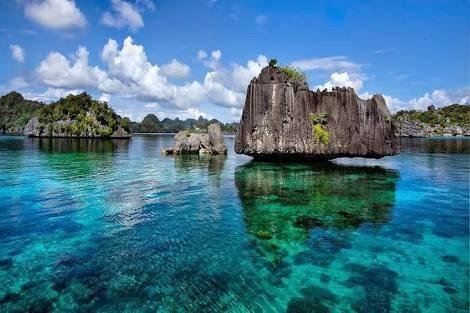WHY SEA WATER TASTES SALTY AND BLUE !
The phenomenon of sea water why it tastes salty, the following explanation
Actually salty taste in sea water comes from the mainland, chronological like this ... At the time of rain in the land of water will seep in the ground and little by little will come out again through the rivers and finally reach the sea. Well on the way to the sea water from the mainland also brings mineral salts so that the sea filled with mineral salts.
We know the ocean has a very large surface so that this becomes one of the big evaporation factors, when the sea water evaporates only H20 (water) while the mineral salt salt remains with the lauu water, that's how the sea tastes. The salinity of seawater is influenced by the temperature factor, usually the hotter the area the salty sea water. Then why the water in the lake did not taste salty when the water is also from the mainland? The answer is because the water level of the lake is not large enough so that the evaporation is not so big, that is, the water that evaporates with water into the lake is still balanced and the mineral source is very limited in contrast to the sea that the mineral source from various corners of the world becomes one.
Sea water is water from the ocean or ocean. Sea water has an average salt content of 3.5%. This means that in 2.5 liters (2500 ml) of sea water there is 60 grams of salt (mainly, but not entirely, salt kitchen / NaCI).
Although most sea water in the world has a salinity of about 3.5%, sea water is also different salt content. The most bargain is east of the gulf of finland and north of the Gulf of Bothnia, both parts of the Baltic Sea. The most salty is the Red Sea, where high temperatures and limited circulation make high evaporation and little water input from the rivers. Salt levels in some lakes can be even higher.
Sea water has a salt content because the earth is filled with mineral salts contained in rocks and soil. For example sodium, potassium, kasium, etc .. When river water flows into the ocean, the water brings salt. The sea waves that hit the shore can also produce salt contained in rocks. Over time the sea water becomes salty because it contains lots of salt.
WHY ARE BLUE COLOR WATER?
The reason sea water is blue is basically, water has no color. Water only absorbs light which then reflects it. There is one question that is often asked about the sea, is about the color. "Why the Sea Looks Blue?"
There are two major optical processes in seawater, and solutes or suspended in seawater, when interacting with incoming light from the sun. These two processes are absorption and scattering. In the atmosphere, the main reason that the sky is blue is caused by the scattering of the Sea's light, the main way water interacts is with the absorption of light, the water absorbs red light, and to a lesser extent water also absorbs red light, and at a more refreshing rate, Absorb light yellow and green, causing the color can change change depending on depth and place. The blue color is the most absorbed by the water, so the water appears blue. In short, the deeper the depths of the ocean, the more it is bluish in color.
The diagram above shows the depth of light that will penetrate in the sea water. Because red light absorbs strongly, makes it disappear, and blue light continues to penetrate into. From the diagram is also the reason why the water in the bathtub is white, in because all the light is still in the water absorbed so as to make the color appear white. While as the sun begins to set and rises, the sea water will appear red on the surface due to the absorption of the light.
Different colors in the sea, rivers and lakes are also caused by plants that live on the ground like algae found in the red sea, and precipitates that are preserved in the water. Such as the brown color that is deposited from the river, making the color appear murky. 